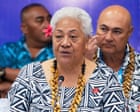
As the world navigates through dynamic shifts in political landscapes and international relations, several significant events unfolded this past week, marking notable changes and challenges across continents. In the Pacific, Samoa experiences a political transition, while Victoria, Australia, remains vigilant in addressing public protests. Meanwhile, a call for international diplomatic efforts echoes from Australia, and economic adjustments challenge India’s trade with the United States.
In Samoa, a distinct political chapter comes to a close with the conclusion of Fiame Naomi Mata’afa’s tenure as the island nation’s first female Prime Minister. Often hailed as the ‘Iron Lady of the Pacific,’ Fiame’s leadership faced rigorous trials amidst political infighting that characterized recent months. However, the electoral results of the week brought forth a new direction as the opposition Fa’atuatua i le Atua Samoa ua Tasi (FAST) party clinched a majority, securing 30 out of the 50 contested parliamentary seats. This transition marks a pivotal moment in Samoa’s political narrative, reflecting a democratic process responding to the evolving aspirations of its people.
Turning attention to Australia, public engagement with socio-political discourse remains robust, especially around sensitive issues such as demonstrations by extremist groups. Recent occurrences involved neo-Nazi groups assembling on the steps of Victoria’s parliament – an incident that happened twice over the past two years. These events have sparked discussions around the effectiveness of existing protest laws and the potential necessity for their revision, despite the significant powers already vested in local law enforcement. Authorities and communities continue to work towards finding a balanced course in managing public expressions while ensuring peace and order.
Simultaneously, another aspect of international collaboration emerges from the calls of Australia’s Ukrainian community. The focus is on Oscar Jenkins, an Australian citizen and former teacher who voluntarily joined Ukrainian defense efforts amid the ongoing Ukraine-Russia conflict. Currently detained after being captured by Russian forces and sentenced to 13 years imprisonment under accusations of acting as a “mercenary,” Jenkins’ predicament has raised concerns about international prisoner swaps. The community has urged Australia’s Foreign Minister Penny Wong to advocate for Jenkins’ inclusion in the negotiations, emphasizing the need to prevent his case from fading into obscurity.
The economic interplay between nations also saw significant adjustments, particularly impacting India’s long-standing trade relationships. The recent decision by U.S. President Donald Trump to implement a 50% tariff on a substantial portion of India’s £65 billion merchandise exports stands to challenge various Indian industries oriented toward the U.S. market. Sectors like textiles, footwear, jewelry, and seafood, which significantly contribute to the trade volume, face the daunting task of reassessing operational costs and market strategies. While concerns of job security loom, Indian businesses continue to explore adaptive measures to mitigate the impacts of these tariffs.
Each of these events, in their unique context, affirms the complexities and interconnectedness of today’s global society. As nations navigate through political changes, public discourse, and international diplomacy, the path forward is rife with opportunities for growth, understanding, and collaboration. The week serves as a reminder of the shared responsibilities and aspirations in building a positive and stable global future.
Source: {link}
